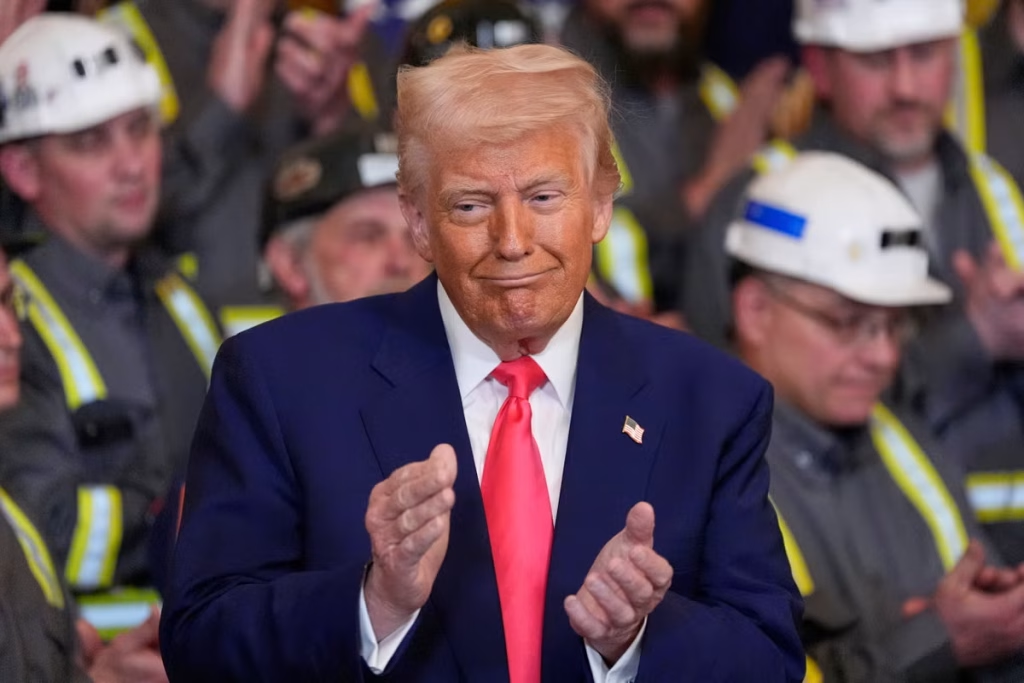President Donald Trump insisted on Friday that his tariff policy was “doing really well,” despite China’s decision to hike levies on US goods to 125 percent, escalating the trade war between the world’s two largest economies.
The announcement of China’s retaliation sent financial markets into turmoil. Investors sold US government bonds, the dollar fell sharply, and stock markets fluctuated as concerns mounted over the deepening global trade tensions.
Trump had already caused market instability the previous week when he announced sweeping import taxes on a range of trade partners. However, he quickly rolled back most of these, reducing them to 10 percent for 90 days, while increasing levies on Chinese goods.
“We are doing really well on our tariff policy,” Trump declared in a post on his Truth Social platform after China revealed its latest tariff increase.
“Very exciting for America, and the World!!! It is moving along quickly,” he wrote.
The White House later reiterated Trump’s optimism regarding a deal with China, noting that 15 other countries had offers “on the table” during the 90-day pause in tariffs. Press Secretary Karoline Leavitt added that “the president made it very clear, when the United States is punched, he will punch back harder.”

The US and China have been exchanging increasingly harsh tariffs since last week. Chinese President Xi Jinping made his first significant comments on the escalating tensions on Friday, telling state media that China was “not afraid.”
Xi also emphasised that China and the European Union should “jointly resist unilateral bullying practices” during talks with Spain’s Prime Minister Pedro Sanchez.
Following Xi’s remarks, Beijing announced that new 125 percent tariffs on US goods would take effect on Saturday, nearly matching the 145 percent tariffs imposed by the US on Chinese imports.
A spokesperson for China’s Commerce Ministry placed full responsibility for the trade tensions on the United States, labelling Trump’s tariffs as a “numbers game” that “will become a joke.” However, China’s finance ministry stated that tariffs would not be raised further, acknowledging that no imports could realistically occur at the new levels.
Despite the intensifying conflict, Trump reiterated on Thursday that he hoped to reach a deal with Xi. “He’s been a friend of mine for a long period of time. I think that we’ll end up working out something that’s very good for both countries,” Trump told reporters.
However, US officials have clarified that they expect Xi to initiate contact first.
As the trade war continued to escalate, financial markets remained on edge. Yields on US government bonds, typically viewed as a safe haven, rose again on Friday, indicating weaker demand as investors expressed growing concern.
The White House maintained, however, that there was no evidence to support speculation that China was liquidating its vast holdings of US bonds — a move that could increase the cost of borrowing for the US government — as part of its retaliation.
Meanwhile, policymakers at the US Federal Reserve warned of higher inflation and slower growth as a result of Trump’s tariff policy.
Economists cautioned that the disruption to trade between the US and China, whose economies are closely intertwined, would drive up consumer prices and could potentially lead to a global recession.
Ipek Ozkardeskaya, an analyst at Swissquote bank, told AFP that the tariff rates were “so high that they don’t make sense anymore,” adding that China was now “ready to go as far as needed.”
The rest of the world is still weighing its response to the trade conflict. Trump had previously praised the European Union for refraining from retaliatory levies, despite initially imposing 20 percent tariffs on the bloc.
Top EU officials and Chinese leaders are set to hold a summit in China in July to mark 50 years of diplomatic ties. Meanwhile, EU trade chief Maros Sefcovic is scheduled for talks in Washington on Monday.
EU Commission President Ursula von der Leyen told the Financial Times on Friday that the EU was prepared with a “wide range of countermeasures,” including potentially targeting US tech firms with measures on digital services.


 Trending
Trending 